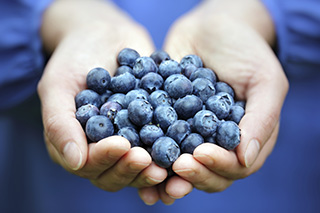What are free radicals, and do they play a role in cancer development?
Free radicals are highly reactive chemicals that have the potential to harm cells. They are created when an atom or a molecule (a chemical that has two or more atoms) either gains or loses an electron (a small negatively charged particle found in atoms). Free radicals are formed naturally in the body and play an important role in many normal cellular processes (1,2). At high concentrations, however, free radicals can be hazardous to the body and damage all major components of cells, including DNA, proteins, and cell membranes. The damage to cells caused by free radicals, especially the damage to DNA, may play a role in the development of cancer and other health conditions (1,2).
Abnormally high concentrations of free radicals in the body can be caused by exposure to ionizing radiation and other environmental toxins. When ionizing radiation hits an atom or a molecule in a cell, an electron may be lost, leading to the formation of a free radical. The production of abnormally high levels of free radicals is the mechanism by which ionizing radiation kills cells. Moreover, some environmental toxins, such as cigarette smoke, some metals, and high-oxygen atmospheres, may contain large amounts of free radicals or stimulate the body’s cells to produce more free radicals.
Free radicals that contain the element oxygen are the most common type of free radicals produced in living tissue. Another name for them is “reactive oxygen species,” or “ROS” (1,2).
What are antioxidants?
Antioxidants are chemicals that interact with and neutralize free radicals, thus preventing them from causing damage. Antioxidants are also known as “free radical scavengers.”
The body makes some of the antioxidants it uses to neutralize free radicals. These antioxidants are called endogenous antioxidants. However, the body relies on external (exogenous) sources, primarily the diet, to obtain the rest of the antioxidants it needs. These exogenous antioxidants are commonly called dietary antioxidants. Fruits, vegetables, and grains are rich sources of dietary antioxidants. Some dietary antioxidants are also available as dietary supplements (1,3).
Examples of dietary antioxidants include beta-carotene, lycopene, and vitamins A, C, and E (alpha-tocopherol). The mineral element selenium is often thought to be a dietary antioxidant, but the antioxidant effects of selenium are most likely due to the antioxidant activity of proteins that have this element as an essential component (i.e., selenium-containing proteins), and not to selenium itself (4).
Can antioxidant supplements help prevent cancer?
In laboratory and animal studies, the presence of increased levels of exogenous antioxidants has been shown to prevent the types of free radical damage that have been associated with cancer development. Therefore, researchers have investigated whether taking dietary antioxidant supplements can help lower the risk of developing or dying from cancer in humans.
Many observational studies, including case–control studies and cohort studies, have been conducted to investigate whether the use of dietary antioxidant supplements is associated with reduced risks of cancer in humans. Overall, these studies have yielded mixed results (5). Because observational studies cannot adequately control for biases that might influence study outcomes, the results of any individual observational study must be viewed with caution.
Randomized controlled clinical trials, however, lack most of the biases that limit the reliability of observational studies. Therefore, randomized trials are considered to provide the strongest and most reliable evidence of the benefit and/or harm of a health-related intervention. To date, nine randomized controlled trials of dietary antioxidant supplements for cancer prevention have been conducted worldwide. Many of the trials were sponsored by the National Cancer Institute. The results of these nine trials are summarized following.
Linxian General Population Nutrition Intervention Trial: This trial was the first large-scale randomized trial to investigate the effects of antioxidant supplements on cancer risk. In the trial, healthy Chinese men and women at increased risk of developing esophageal cancer and gastric cancer were randomly assigned to take a combination of 15 milligrams (mg) beta-carotene, 30 mg alpha-tocopherol, and 50 micrograms (μg) selenium daily for 5 years or to take no antioxidant supplements. The initial results of the trial showed that people who took antioxidant supplements had a lower risk of death from gastric cancer but not from esophageal cancer. However, their risks of developing gastric cancer and/or esophageal cancer were not affected by antioxidant supplementation (6).
In 2009, 15-year results from this trial were reported (10 years after antioxidant supplementation ended). In the updated results, a reduced risk of death from gastric cancer was no longer found for those who took antioxidant supplements compared with those who did not (7).
